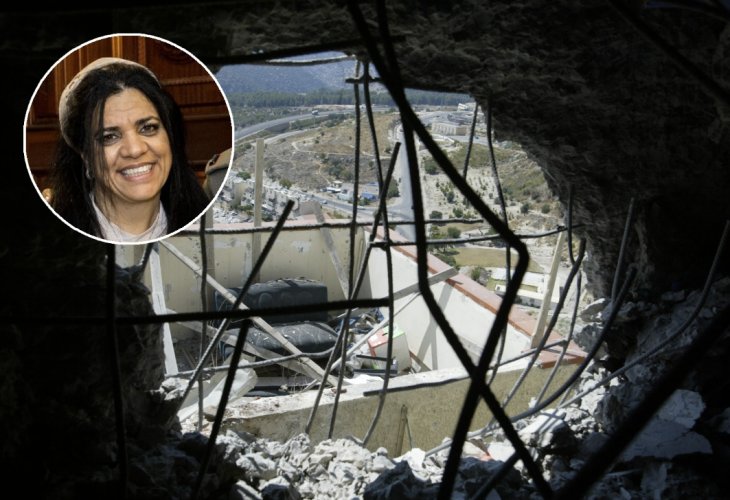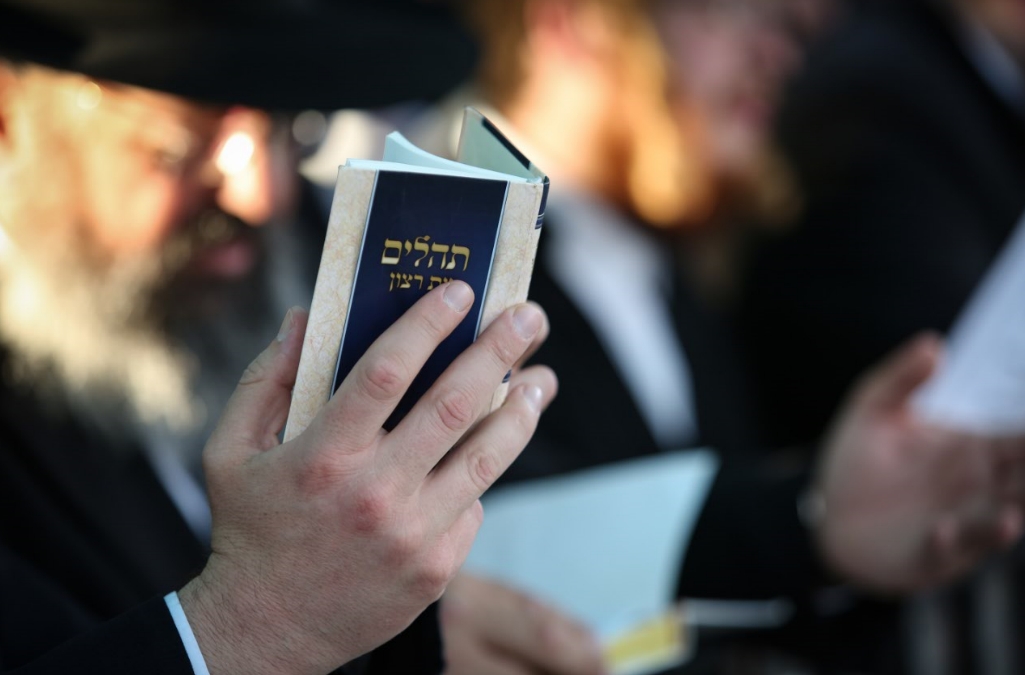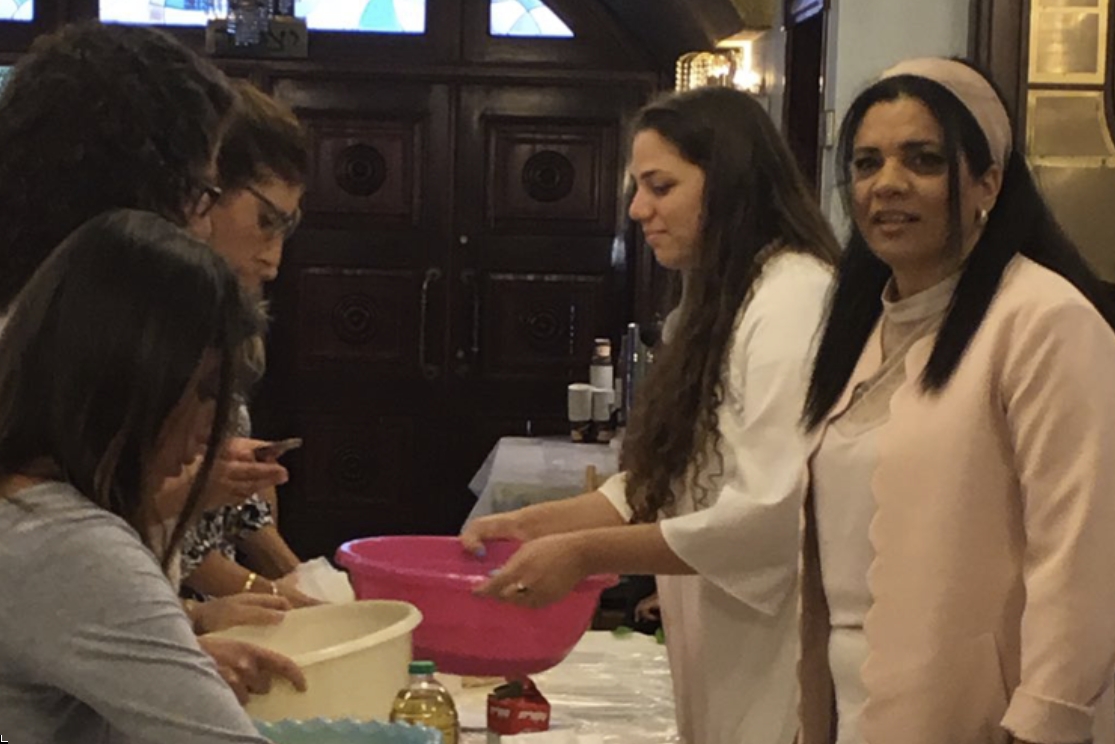Daughter Saved from Katyusha, Mother Manages 'Tehillim Project'
Orna Ben Shalosh witnessed firsthand how her daughter was saved from a Katyusha during the Second Lebanon War, leading her to organize the recitation of Tehillim for the Redemption of Israel. "This is the project of my life," she shares.
 In circle: Orna Ben Shalosh (Illustrative photo: Flash 90)
In circle: Orna Ben Shalosh (Illustrative photo: Flash 90)It was about two and a half years ago. Orna Ben Shalosh, a resident of Nahariya, received a call from a woman she knew from her job as a secretary at the 'Galilee Medical Center – Nahariya'. "Would you like to join the recitation of Tehillim chapters?" her acquaintance asked over the line, explaining that all she had to do was one simple thing - say one chapter of Tehillim each day.
"I told her I was willing," Orna recalls, "but I also added that the only chapter I know by heart is Chapter 121 - 'I lift my eyes to the mountains'. I know it by heart because I used to say it with my daughters when they were little. She replied, 'Fine, the chapter is yours,' and that is how it all started. A few months later, she called me again asking if I remembered to say the chapter. I replied, 'Not only do I remember and continue saying it, but I have also decided to start my own group'."
And Orna not only decided but acted. "I set out to organize as many women and men as I could to read one chapter of Tehillim each day for the redemption of the people of Israel," she shares. "This project developed very quickly and today there are already more than 430 participating daily."

"The Katyusha Fell and I Started to Scream"
But Orna's real story begins much earlier, during the days of the Second Lebanon War. "I work at a hospital in Nahariya as a secretarial assistant," she describes. "About ten years ago, during the war, I was tasked with supervising the workers' children. This was due to the hospital staff working 24 hours a day, seven days a week. The workers didn’t go home at all. Naturally, everyone brought their children to the hospital and left them in the shelter. I was responsible for the activities there and keeping the children engaged. One remarkable moment was every Friday, when we organized a Shabbat reception and candle-lighting ceremony in the shelter with Mrs. Ruti Yifrach, the hospital's administrative director. There were children of all kinds - Sephardic and Ashkenazi, religious and secular, big and small, in short, a melting pot. We all sat around one table, I lit Shabbat candles, someone made *kiddush* and then we sang Shabbat songs. Once my husband even brought fish so we could really feel a Shabbat meal."
On one Friday, Orna recounts with excitement, a great miracle occurred: "Immediately after lighting the candles, my daughter left the shelter, looking with a friend for a place they could be alone to deal with something. They were searching for a lit room. Fortunately, the only lit room was a fortified room. At that moment they entered it, a Katyusha rocket fell, hitting the building where my daughter was."
When Orna remembers this, her voice trembles: "I knew my daughter was with her friend, but I didn’t know where. In those first minutes, I just couldn't function; I only screamed terrible screams. And you must understand, I was responsible for all the children and was supposed to calm them down, but I couldn't control myself.
"Long minutes passed until my husband arrived and assured me that everything was okay and the daughter was found safe and sound. In those breathless moments, Shabbat entered. I gathered all the children around me and lit candles with emotion. Then I said to myself, 'We are now trapped in this shelter, unable to go anywhere. But I take upon myself that on the day we are freed, I will thank Hashem.'
"Indeed," she adds, "after the war ended and I left the hospital gates where I had been for three consecutive weeks, without seeing the light of day, I sought a way to thank Hashem. My husband suggested we take on Shabbat observance, and so we did. Not only did I light candles and made *kiddush* and held a meal, but I also started taking my daughters to synagogue every Friday. Blessed be Hashem, it led to my eldest daughter marrying a Torah scholar, my second daughter graduating from an religious academy, and my third daughter studying at Harel Academy."
But she didn’t stop there. "In recent years, when the opportunity to say chapters of Tehillim came to me, I decided to take it on as well and spread it to many," Orna says.
"Tehillim Accompany Me Everywhere"
How do you reach all the people who participate in the Tehillim reading you organize?
"I simply deal with it all day long. I always have Tehillim books in my bag and I wait for the right opportunity. Sometimes I suggest it to my friends, at other times to family members when I go to family events. I have also handed out many chapters while sitting and waiting for the train.
"I also love traveling abroad once in a while. I participated in a trip with 40 women and distributed Tehillim books to them. At the airport, balloons were being distributed, but I distributed chapters of Tehillim. These are secular women, most of whom don’t even know what it is, but some of them told me that the Tehillim book remained with them and they never take it out of their bag. In general, the responses I receive are usually very warm and enthusiastic. The most common reaction is: 'This chapter is exactly touching my heart, how did you know to choose it?'"

Do you keep in touch with all the people who read the chapters you handed out?
"I don’t maintain frequent contact, but from time to time, I try to call them to check on their well-being and ask if they continue to say the Tehillim and if everything is fine. One time, I called my daughter-in-law's mother, who also participates in the Tehillim, and she was very emotional. She said to me, 'Just today, I traveled from Maalot to Nahariya, and during the journey, the car began to sway. There was no wind and no apparent reason, but it felt utterly unstable and deviated from the course. Naturally, I started mumbling the chapter you gave me, and suddenly the car continued to drive normally, as if nothing had happened."
Last week, for the month of Elul, Orna held a very special ceremony – an event for all the Tehillim participants and women of Nahariya in general, attended by hundreds of women from around the country. The event, sponsored by the city's religious department, included a challah separation ceremony and featured Prof. Yohanan Stessel, author of 'Biblical Pearls of Tehillim', Rabbi Bat Sheva Kook, and Mrs. Maya Regev. "We started the event with a wonderful presentation that began with the reading of 'Song of Ascents' by my granddaughter Talia, who is just four years old," Orna says. "It was very emotional.
"I feel that this Tehillim project is the work of my life," she concludes, "and it is an excellent way to thank Hashem for all the kindness He continually bestows upon us."

